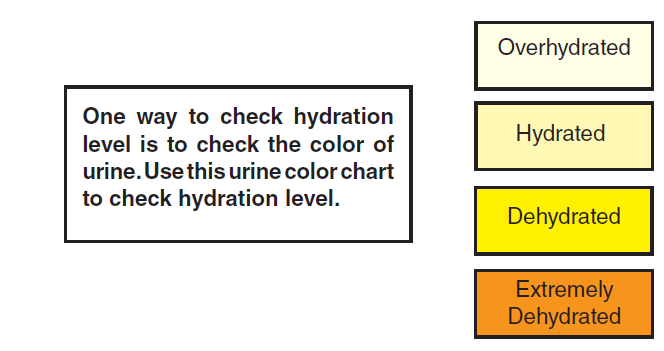Hydration and Athletes
Hydration is important for all athletes. It helps to delay feelings of tiredness. Proper hydration also supports performance. Staying well hydrated is important for athletes who engage in events lasting longer than an hour. Participating in physical activity in extreme hot or cold may increase an athlete’s hydration needs.
Dehydration and Nutrient Loss
Fluids and nutrients may be lost when athletes exercise for long periods of time. This often occurs when athletes train at a high intensity or in a hot setting. Fluid and nutrient losses can cause an athlete’s body functions to be out of balance. This can hurt both health and performance.
Some actions that may lead to a body being out of balance are:
- drinking too much water,
- starting exercise while dehydrated or
- not eating enough nutrients in regular diet.
Figure 1. Urine color chart.
Note: If taking a multivitamin, sometimes urine will be yellow or green for several hours after taking the vitamin. This is due to the vitamin itself. It may not be a sign of hydration level.
Table 1. Hydration level and body effects.
| Hydration Level | Definition | Body Effects |
|---|---|---|
| Moderate Dehydration | 2% or more of body weight lost through sweat. | Delay in brain function and exercise performance. |
| Dehydration | 3% to 5% of body weight lost through sweat. | Decreased exercise performance and increased risk of injury. |
| Overhydrated | Occurs from not eating enough sodium or from drinking too much water. | Headache, vomiting, swollen hands and feet, restlessness, extreme tiredness, confusion or wheezy breathing. |
Before Exercise
- Start drinking fluid two to four hours before training.
- Drink about 1 ounce per 12.5 pounds of body weight of water or a sports drink. Use the table below for a quick reference of this recommended intake.
Table 2. How much water to drink before exercise based on body weight.
| Weight in pounds | Total ounces of water or sports drink two to four hours before exercise |
|---|---|
| 100 | 8 |
| 125 | 10 |
| 150 | 12 |
| 175 | 14 |
| 200 | 16 |
| 225 | 18 |
| 250 | 20 |
During Exercise
An athlete may need sports drinks or snacks that contain specific nutrients. These nutrients are called electrolytes and carbohydrates. The athlete should drink a sports drink that includes electrolytes and carbohydrates before and during exercise if they:
- will be exercising longer than two hours,
- are a salty sweater (gritty white sweat or a white line on dark cloth) or
- need to drink a lot of water to rehydrate
After Exercise
Athletes should replace the water lost from heavy breathing and sweating during exercise. They should also replace water lost from normal daily activities, like going to the bathroom. The table below is a guide to help athletes replace fluid lost during exercise. It shows the correct amount of water to add to their normal water intake. In addition, consume foods like fruits, vegetables and salted nuts or pretzels to recover electrolytes lost.
Table 3. Guide to help athletes replace fluid lost during exercise.
| Training Level | Activity Length | Extra Fluid Intake |
|---|---|---|
| Light | 30 minutes | 8 to 16 ounces of water per hour of exercise |
| Moderate | 60 minutes | 8 to 16 ounces of water per hour of exercise |
| Intense | 90 minutes | 8 to 16 ounces of water plus electrolytes per hour of exercise |

